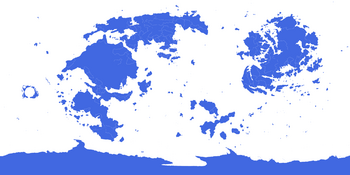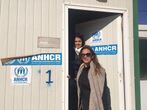Assembled Nations
Assembled Nations | |
|---|---|
| Motto: Omnes loqui, nulla actio | |
 Members of the Assembled Nations | |
| Location | Eurth |
| Official languages |
|
| Type | Intergovernmental Organization |
| Membership | 139 Member States |
| Leaders | |
| John Doe | |
• Deputy Secretary | Jane Doe |
| Establishment | |
• AN Charter signed | 1 May 1957 |
• Charter entered into force | 1 January 1958 |
• First assembly meeting | 1 May 1958 |
Website www.an.int | |
The Assembled Nations (AN) is an intergovernmental organization with the goal to further peace and security on Eurth. The AN is made up of almost every country in the wurld. The AN was established after several major conflicts that badly affected multiple continents with an unprecedented scale of destruction, the death of XX million people, and the use of weapons of mass destruction.[1] The dove found on the Assembled Nations' flag and emblem symbolizes the continued endeavour for peace. Its threefold mission is to foster dialogue and cooperation between governments worldwide; to advance international peace and prosperity; and to defend the human rights and individual freedoms of people everywhere. To advance this mission, the Assembled Nations manages many agencies around the Eurth. These include peacekeeping missions, security collaboration projects, human rights campaigns, economic and social development projects, environmental awareness and protection activities, as well as humanitarian missions for populations in crisis.
History
Proposed timeline for AN history.
- Rise (1954-1968):
- Event — After a long period of major international conflicts, the AN is founded. Treaty of $City.
- Action — The organisation establishes many child agencies. This greatly increases its power and overview.
- Opinion — The AN is generally trusted by governments and the public.
- Failure (1968-1980s):
- Event — AN fails to prevent the Second Argic War.
- Action — The organisation survives, but with reduced funding and power.
- Opinion — As a consequence of these failures, the public trust in AN by governments and public is damaged.
- Irrelevance (1980s-2020s):
- Event — In following decades of world affairs, the AN forced to take a backseat. The AN is really weak due to glubal disunity. Countries often act with impunity and little consequence.
- Action — The AN is mostly unable to stop conflicts before they erupt. They can only assist in dealing with post-conflict problems, such as: refugees and peacekeeping. And also the recovery from natural disasters.
- Opinion — Public are mostly indifferent to the AN, governments trust it to carry out its limited duties.
- Return (2020s):
- Event — The Anglian War and other world events.
- Action — Many governments come together to restore a system of global peace.
- Opinion — The AN achieves something which many individual nations alone could not achieve on their own.
Charter
WIP
Structure
The Assembled Nations[2] encompasses four principal institutions.
- Assembled Council (AC): the primary deliberative body, made up of one representative ambassador from each member nation.
- Security Council (SC): For matters pertaining to issues of peacekeeping and security.
- International Court of Justice (ICJ): the paramount judicial venue that settles legal disputes between nations; advizes on legal questions submitted by the AC.
- Secretariat (SEC): the general executive of the AN. (WIP. Do we really require this institution?)
Agencies
There are numerous other AN-affiliated and related agencies distributed around the wurld. These include:
- ANCAO (AN Civil Aviation Organisation) in Tamworth, Gallambria
- ANCLOS (AN Convention on the Law of the Sea) in $city, $country.
- ANDPO (AN Department of Peace Operations) in $city, $country.
- ANESCO (AN Educational, Scientific and Cultural Organisation) in $city, $country.
- ANHCR (AN High Commissioner for Refugees) in $city, $country.
- ANICEF (AN International Children's Emergency Fund) in $city, $country.
- ANOS (AN Organisation for Standardisation) in $city, $country.
WIP. Here are some other organisations we might have a use for.
- Environmental Research and Protection Organisation in $city, $country.
- Global Bank Group in $city, $country.
- Global Meteorological Organisation in $city, $country.
- International Sea Justice Court in $city, $country.
- World Currency Bank in $city, $country.
- World Food Aid Programme in $city, $country.
- World Health Organisation in $city, $country
First Secretary
The First Secretary of the Assembled Nations (FSAN) is the highest ranking official, responsible for the executive leadership of the organisation. They are the head of the AN Chief Secretariat located in $CityName, $Country. In their role, they are assisted by a deputy and by the director-general of administrative affairs. The FSAN is elected by the organisation's membership to serve a single six-year term.
| No | Portrait | First Secretary[3] (born–died) |
Years in office | Country of origin[4] |
|---|---|---|---|---|
| 1 |  |
Mrs Katya Stănescu (1912-1964) |
1957-1963 | |
| 2 | Mrs Yulia Lemanczyk (1908-1986) |
1963-1969 | ||
| 3 | Mr Johandry Dubert (1922-2003) |
1975-1981 | ||
| 4 |  |
Mrs Arrica Sours (1928-2012) |
1981-1987 | |
| 5 | Mrs Flavia Pierle (1936-2018) |
1987-1993 | ||
| 6 |  |
Mrs Perrine Bergsbaken (1938-2019) |
1993-1999 | |
| 7 | Mr Virgil Chai (1948-2026) |
1999-2005 | ||
| 8 |  |
Mrs Cécile Mychael (1950-2028) |
2005-2011 | |
| 9 |  |
Mr Eriyon Goecker (1958-2039) |
2011-2017 | |
| 10 |  |
Mr Antwayne Zagula (1971-2053) |
2017-2023 |
Membership
Unique among international organizations, every independent sovereign state is considered to be a member. States can decline this by explicitly rejecting their membership. Additionally, any entity judged by the Assembled Council to "exercise stable de facto control over a territory and population" also has a right to membership, even if it is unrecognized by other AN members.
 Abantium
Abantium Adaptus
Adaptus Advocatius
Advocatius Afropa
Afropa Ahrana
Ahrana Akiiryu
Akiiryu Alvernia
Alvernia Anatea
Anatea Andalla
Andalla Ateenia
Ateenia Aurivizh
Aurivizh Ayubi
Ayubi Bahiristan
Bahiristan Bainbridge Islands
Bainbridge Islands Baltica
Baltica Burkini
Burkini Cabarria
Cabarria Cashar
Cashar Cristina
Cristina Damak Var
Damak Var Dazhdinia
Dazhdinia Delamaria
Delamaria Deltannia
Deltannia Republic of Dniester
Republic of Dniester Dolchland
Dolchland Ebrary
Ebrary Elde
Elde Eldorado
Eldorado Esonice
Esonice Estimeria
Estimeria Euandria
Euandria Eulycea
Eulycea Faramount
Faramount Fina
Fina Fravina
Fravina Fubukino
Fubukino Fulgistan
Fulgistan Galahinda
Galahinda Greater Galicia
Greater GaliciaGallambria
 Girkmand
Girkmand Gotneska
Gotneska Great Anglia
Great Anglia Great Xio
Great Xio Grenesia
Grenesia Haruspex
Haruspex Hemahat
Hemahat Hexanesa
Hexanesa Hinterlands
Hinterlands Ide Jima
Ide Jima Iverica
Iverica Iwenland
Iwenland Kahnikstan
Kahnikstan Kertosono
Kertosono Kirvina
Kirvina Kōri-Chi
Kōri-Chi Kotowari
Kotowari Littland
Littland Llalta
Llalta Lysian Republic
Lysian Republic Lusuviya
Lusuviya Magnus
Magnus Mahana
Mahana Malskia
Malskia Mantella
Mantella Mauridiviah
Mauridiviah Mekabiri
Mekabiri Mevraq
Mevraq Miiros
Miiros Mitō
Mitō Mokhavia
Mokhavia Montemadia
Montemadia Narva
Narva Ngoc Luat
Ngoc Luat Niederoestereich
Niederoestereich Noble Nykia
Noble Nykia Norrium
Norrium Nyantastan
Nyantastan Orioni
Orioni Oyussa
Oyussa Prymont
Prymont Qarau
Qarau Qubdi
Qubdi Red Iberos
Red Iberos Rhand
Rhand Rhava
Rhava Rhodellia
Rhodellia Rohini
RohiniRoqoo
 Safiloa
Safiloa Saint Francoisbourg
Saint Francoisbourg Sanctum Imperium Catholicum
Sanctum Imperium Catholicum San Ba
San Ba San Castellino
San Castellino San Giorgio
San Giorgio San Jorge
San Jorge San Lorenzo
San Lorenzo Sanarija
Sanarija Sawbrania
Sawbrania Sefesia
Sefesia Seylos
Seylos Shapashun
Shapashun Skrovja
Skrovja Sporsia
Sporsia Stedoria
Stedoria Sunset Sea Islands
Sunset Sea Islands Suverina
Suverina Tagmatium
Tagmatium Tamurin
Tamurin Thransaltz
Thransaltz Transbaltia
Transbaltia Ulfheimr
Ulfheimr Uppsund
Uppsund Variota
Variota Vasqqa
Vasqqa Velaheria
Velaheria Volsci
VolsciVolta
 Vostau
Vostau Wajoka
Wajoka Walneria
Walneria Yien
Yien Yuropa
Yuropa Zaxar
Zaxar Zharr
Zharr
Peacekeeping missions
AN Department of Peace Operations (ANDPO)
| Dates of mission | Name of mission | Location | Conflict |
|---|---|---|---|
| 2006–2009 | Assembled Nations Mission in Zekistan (ANMIZ) | Civil war in Zekistan[5] | |
| 2016–present | Assembled Nations Mission in Afropa (ANMIA) | War on Violetist Liberation Army[6] | |
| 2016–present | Assembled Nations Mission in Bainbridge Islands (ANMIBI) | Meteorolan anti-piracy[7] |
References
- ↑ OOC. Lore to be established. Iverica mentioned there was a nuclear weapon used against Mat Troi Lan (Sunset Sea Islands) during the Thalassan War.
- ↑ OOC. There is also an Assembly of Nations in Aurorum. On 14 January 2022 we checked with User:Concleror to ensure there would be no problem of overlapping names or abbreviations. They responded positively to our proposal. https://discord.com/channels/282995547755905024/374411025983864832/931548778140401706
- ↑ OOC. Gender was decided by random coin flip. Heads is female. Tails is male. https://www.google.com/search?q=flip+a+coin
- ↑ OOC. Historic leadership was decided at random, by picking a random number from the existing Membership list. https://www.wolframalpha.com/input/?i=random+number+between+1+and+111
- ↑ Dark times over Zekistan (3 September 2006); Zekistan invasion (12 September 2006)
- ↑ War on Violetist Liberation Army (17 August 2016)
- ↑ The Imperial Navy sets sail, Chaper 3: Preparation (9 April 2019)
External links
- Starting our own Model UN (30 September 2017)
- From Skies to Safety OOC (13 August 2018)
- International organizations (2 March 2020)
- International Peacekeeping Force (21 March 2021)




